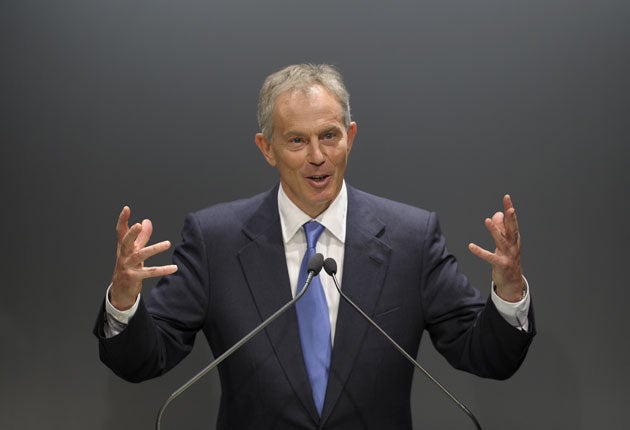Chilcot to grill Blair on how he 'misled' Iraq war inquiry
Panel recalls former PM to answer 'grave doubts' about the veracity of his original evidence

Tony Blair will face allegations that he has "misled" members of the Iraq inquiry when he returns to give evidence to the panel this week.
Members of the five-strong Chilcot inquiry have grave doubts over the truthfulness of statements the former prime minister made to them last January and in his memoirs, published last autumn. The Independent on Sunday understands that the inquiry is concerned over Mr Blair's evidence on the legal advice he received before agreeing to join the invasion, and the timing of the decision to go to war.
He also faces claims that he misrepresented the findings of a report from international inspectors sent into Iraq following the invasion to look for evidence that Saddam Hussein had been building an arsenal of weapons of mass destruction (WMD). The Iraq Survey Group (ISG), found no evidence of WMD, crucially undermining the case for war.
Although Mr Blair conceded that intelligence suggesting Saddam had a WMD stockpile was wrong, he repeatedly used the ISG report, delivered in 2004, to support his actions. During his six-hour session at the inquiry, he said: "It is absolutely clear from the Iraq Survey Group... that [Saddam] was concealing material he should have delivered up to the UN."
In his book A Journey, Mr Blair wrote that the report proved Saddam had made a "tactical decision to put such a programme into abeyance, not a strategic decision to abandon it".
The inquiry panel, which has since interviewed the man who wrote the report, the former ISG chief Charles Duelfer, has now questioned Mr Blair's version of the group's findings.
"Blair's version of the Duelfer report was partial, to say the least, and clearly misleading," a senior source close to the inquiry said last night. "There is a feeling that on this and on elements like the legal advice, he wilfully misrepresented the facts. The [panel members] are bruised by the suggestions that they gave him an easy ride last year, but they will be more prepared this time round."
The panel, led by Sir John Chilcot, will for the first time be able to challenge Mr Blair's account of the legal advice he received using documents that were declassified several months after his appearance last year.
Among those documents was the revelation that the former attorney general, Lord Goldsmith, warned Mr Blair two months before the war that an invasion would be illegal without a fresh UN mandate. The opinion was repeated two weeks later, but in Washington the following day Mr Blair was told by President George Bush that the invasion would begin in mid-March, with or without a second resolution. By the eve of the conflict, following a visit to US government lawyers, Lord Goldsmith had changed his advice.
Toby Dodge, an Iraq expert at Queen Mary, University of London, said: "Blair's take on the Duelfer report is a big issue, but the Goldsmith memos are also significant and the inquiry will get its chance to use them in questioning Mr Blair over the version of events he has given so far."
The solicitor Phil Shiner, an expert on the war's legality, who has represented a number of its victims, said: "Lawyers don't produce 13 pages of carefully argued opinion stating that a second resolution is needed, and then issue a brief statement only days later saying the opposite."
Join our commenting forum
Join thought-provoking conversations, follow other Independent readers and see their replies
Comments
Bookmark popover
Removed from bookmarks